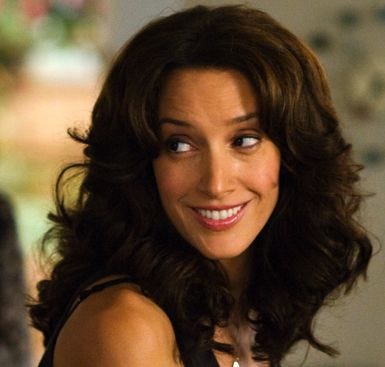Bette Porter -- "The L Word"
mini essay about bridging the gap between the queer and cishet populations

“The L Word” ran from 2004 until 2009. I would say that it was pretty “radical” for 2004 considering it was a show that centered around the lives of queer women who all had different life goals, priorities, and socioeconomic statuses.
However, I feel as though one of the main reasons it was so progressive for the time period was because of its centering of a Black lesbian. Bette Porter was one of the main characters on the show, if not the main character, and she was dynamic. She had a passion and professional ambition with her art curation. Her love life was the perfectly entertaining, emotionally taxing investment every audience member desires. She had strengths; her drive and powerful presence made her an admirable character. And she had her flaws that made audiences sigh with frustration. She wasn’t just a token gay character (the show actually had a token straight character) and while her struggles were queer struggles (obviously), they were conveyed in a way that created a sense of normalcy, as though Black queer life was normalized in real life, which it certainly wasn’t.
Bette and Tina (her partner) wanted a baby and they had to go through the process of deciding whether to artificially inseminate or adopt. Then they had to decide who would carry the baby to term. Then they had to find a donor, one that would ensure that the baby resembled both Bette and Tina. Then they had to go through with the insemination. More than once. This is a long and common process among couples whose reproductive organs are the same and the show illuminated the accompanying challenges.
And though Bette resided in a part of Los Angeles that seemed like a queer hub, when she left this bubble, she was faced with intersectional discrimination and her sex life was far more pertinent to employers than a man’s or a straight person’s would have been. Even within the queer community, her Blackness was questioned and this idea of having to choose to be a Black woman first, lesbian second, or lesbian first and Black woman second, was brought up to her as though the two are not intrinsic parts of her identity that cannot be separated without dissolving her being. (It reminded me of when I fill out an electronic form that asks about my race but doesn’t allow me to “select all that apply.” Am I just supposed to choose what I “most” identify with? How would I decide that if all of the races I identify with compose my full identity, an identity that would be incomplete if I were missing one part of it?)
But while displaying challenges that arose in Bette’s life as a result of her queerness, the show simultaneously closed this perceived chasm between the queer and cishet (cisgender heterosexual) populations. Queer people are discriminated against, faced with violence as a result of simply existing, not completely accepted into society, and given a lower standard of healthcare (among many other things) and this knowledge should hover around your thoughts while I am attempting to make this “unifying” point.
Bette and Tina struggled with conception, but heterosexual couples and heterosexual presenting couples can also face obstacles when trying to start a family. Bette had a little adultery problem that actually followed her into the show’s reboot, “The L Word: Generation Q,” which is currently running, and this is certainly something that can be present in any type of relationship. Additionally, she had dreams and ideas for her career, some of which she accomplished, others she didn’t, which is something cishet people can identify with. There was nothing completely isolating about her character. There were certain aspects of Bette’s life that most people could relate to, the thing that varied was the extent to which a viewer related to her, which probably depended on how much of Bette’s identity overlapped with that viewer’s.
This parallel is not something that needed to be done deliberately and there was no attempt at conveying this message that the gays are just like the straights, nor is that the argument I’m trying to make, I just think that lessening the dualism between queer life and cishet life takes steps towards unity, acceptance, and this realization that different is not the equivalent of less. Or that different in one aspect does not necessarily mean different in all aspects. Queer people do face unique, more numerous, more difficult to overcome obstacles as a result of their sexuality than cishet people do; that should not be diminished. But sometimes there are shared challenges. Cishet people are privileged, but some of their everyday problems are everyday problems queer people also have.
Other characters within the show did their part in demonstrating this but Bette Porter propelled the show and the plot significantly and in a way that defied stereotypes. And while regressive themes were sometimes explored and the character of Bette Porter could have been played by a Black woman who was actually queer, Jennifer Beals is an ally and her portrayal of Bette Porter was, and still remains, brilliant.
Happy Pride Month. Use that cisgender heterosexual privilege of yours for good (if you have it, of course), this month and always.

